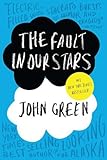 John Green’s YA novel [amazon asin=0525478817&text=The Fault in Our Stars] was recently named one of the 100 Best Ever Teen Novels. The novel’s protagonist, Hazel Grace Lancaster, is a sixteen-year-old girl with an incurable cancer. She meets seventeen-year-old cancer survivor Augustus Waters at a support group for teens with cancer. Hesitant to become too close to Augustus and worried over how her death would affect him (Hazel memorably describes herself at one point in the novel as a grenade), she eventually succumbs to Augustus’s charms as they connect over Hazel’s favorite novel, An Imperial Affliction by Peter Van Houten. Augustus uses his Genie Foundation wish on a trip to Amsterdam with Hazel so that she can find out from Peter Van Houten what happens to the other characters in his novel after his protagonist, Anna, dies. The rest of the story doesn’t turn out as Hazel expected—in every single way.
John Green’s YA novel [amazon asin=0525478817&text=The Fault in Our Stars] was recently named one of the 100 Best Ever Teen Novels. The novel’s protagonist, Hazel Grace Lancaster, is a sixteen-year-old girl with an incurable cancer. She meets seventeen-year-old cancer survivor Augustus Waters at a support group for teens with cancer. Hesitant to become too close to Augustus and worried over how her death would affect him (Hazel memorably describes herself at one point in the novel as a grenade), she eventually succumbs to Augustus’s charms as they connect over Hazel’s favorite novel, An Imperial Affliction by Peter Van Houten. Augustus uses his Genie Foundation wish on a trip to Amsterdam with Hazel so that she can find out from Peter Van Houten what happens to the other characters in his novel after his protagonist, Anna, dies. The rest of the story doesn’t turn out as Hazel expected—in every single way.
Wow. John Green has to be one of the best writers of YA fiction. I can give no higher praise than that he reminds me Judy Blume in his ability to capture teenagers as they really are. Hazel and Augustus are charming and precocious, but not in an annoying way. I had the sense as I read that they had so much time to contemplate the big questions and in facing death had simply grown up more than your average teenagers. They have a rare joy for life that I would imagine only young people who have faced their own mortality might have. They are delightful, and I felt if I had been their age and known them for real, I hoped they’d have let me in their circle to be their friend. The Fault in Our Stars is a gorgeous novel, beautifully written, tightly plotted, and poignant and funny. I think its place in NPR’s list is well deserved.
You have to check out this excellent review of the book at Forever Young Adult. Posh cast it better than I could imagine, so I’ll beg off that responsibility (which I have been horrible about remembering to do, anyway).
Rating:




Full disclosure: I borrowed this book from my public library.
Late to the train, but glad you're aboard! What amazed me is how he ran this gauntlet without slipping into bathos (which, I guess, is just pathos after it's had a good washing).
Yes! It's tough to write about kids with cancer, but he managed it well, and you're right. He has great finesse as a writer. And yes, I am late to the game.
I just listened to TFIOS on audio recently, and it was excellent! I don't think I'll get a review done, but there are so many other rave reviews the world will get along fine without mine!
I enjoyed it so much. I'm glad it has so many fans. It's a book that I think a lot of folks need to read.
This was such a wonderful book. I wondered what kind of research he did before writing it — I'd be interested to know! I thought he did such a good job, and it came off really truthful (I thought).
I agree! I can't say definitively, but he did thank a family in his acknowledgements, which made me think perhaps they were helpful (Esther Earl and the Earl family). He mentions that a nonprofit, This Star Won't Go Out, was founded by the Earl family in Esther's memory, which is what made me think they may have provided some assistance. He also directs readers to The Emperor of All Maladies by Siddhartha Mukherjee, which was probably another source of information, as well as The Biology of Cancer by Robert A. Weinberg and also thanks several people I think might be doctors he consulted.